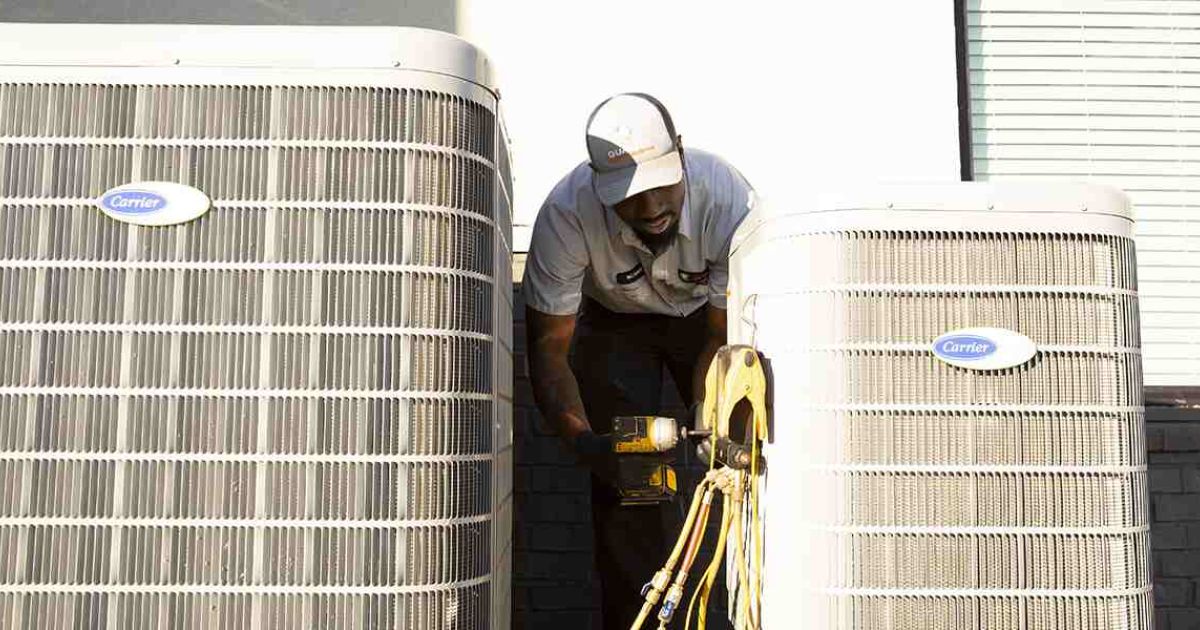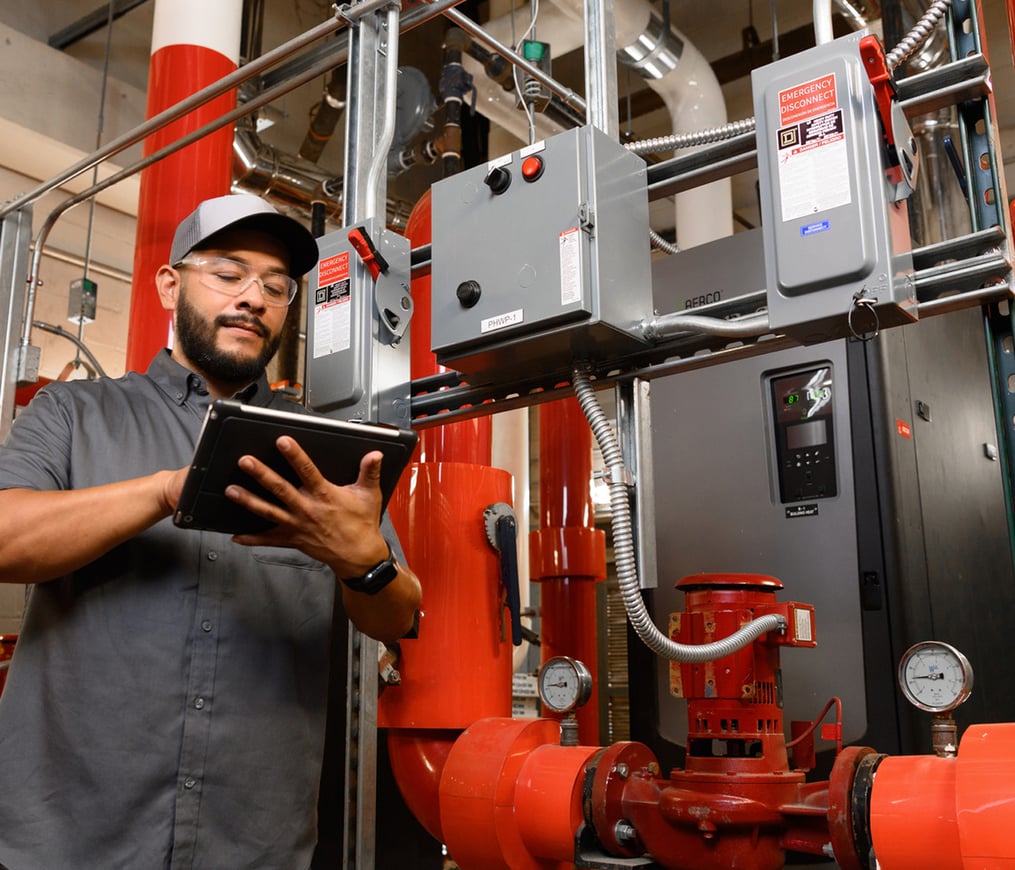A Comprehensive Check Out HVAC Services and Their Influence On Energy Performance and Cost Savings
With technological innovations like smart thermostats and high-efficiency parts, the potential for optimizing system efficiency is huge. As we explore the intricate relationship in between HVAC systems and operational prices, including the change towards environmentally pleasant alternatives, the inquiry develops: how can these methods be properly carried out to optimize both environmental and economic advantages?

Importance of Heating And Cooling Systems
HVAC systems are an essential component of modern-day structures, playing an important role in maintaining comfy and healthy indoor settings. These systems, incorporating home heating, ventilation, and air conditioning, are vital for managing temperature, humidity, and air top quality, consequently guaranteeing the well-being of owners. Efficient a/c systems add significantly to developing an ideal indoor environment, which is vital for both domestic and industrial rooms.
In business buildings, HVAC systems are important to providing a effective and safe environment. By regulating interior climate conditions, these systems assist prevent the development of mold and mildew and the spread of airborne impurities, therefore protecting the wellness of customers and workers. Additionally, in household setups, a/c systems improve living conditions by using constant thermal convenience and boosting indoor air quality, which is vital for total wellness.
Furthermore, the style and maintenance of cooling and heating systems have a straight influence on energy consumption and operational prices. Properly created and kept systems can significantly minimize power usage, resulting in lowered utility costs and a smaller carbon impact. The effectiveness of these systems therefore plays an important role in advertising sustainability and energy preservation within buildings, highlighting their relevance in the modern-day architectural landscape.
Breakthroughs in A/c Innovation
Development in HVAC technology is changing the means buildings handle interior environments, ushering in a brand-new period of performance and control. Recent innovations have concentrated on optimizing power usage while improving individual comfort. One notable growth is the integration of clever thermostats, which use fabricated knowledge to learn tenancy patterns and adjust temperature levels accordingly, reducing unnecessary power use.
Variable Cooling Agent Flow (VRF) systems represent an additional substantial leap onward. These systems enable for accurate temperature control in different zones of a structure, boosting convenience and reducing energy waste. VRF technology is specifically beneficial for huge commercial spaces, supplying adaptability and scalability.
Furthermore, the development of Net of Things (IoT) gadgets has transformed a/c systems right into interconnected networks capable of real-time data collection and analysis. This connection makes it possible for anticipating upkeep, making sure systems run at peak effectiveness and reducing unexpected downtime.
Furthermore, innovations in products and layout, such as the use of high-efficiency coils and compressors, have improved general system efficiency - Heating Contractor. The fostering of eco pleasant refrigerants also emphasizes the industry's dedication to sustainability
These technical developments are critical in minimizing functional costs and ecological influence, establishing brand-new standards for constructing environment monitoring.
Cooling And Heating Upkeep and Performance
Ensuring optimal efficiency of cooling and heating systems expands beyond technological developments; it also pivots on reliable upkeep techniques. Normal maintenance is vital for sustaining effectiveness, reducing energy usage, and extending the life span of HVAC systems. The primary goal is to make sure that all parts work at their peak possibility, thereby lessening energy wastage and maintaining regular interior convenience levels.
Regular upkeep jobs, such as cleansing or replacing air filters, checking refrigerant levels, and evaluating ductwork for leaks, are necessary for preventing unnecessary pressure on the system. Filthy or stopped up filters can obstruct air flow, creating the system to function more challenging and take in even more power. Likewise, poor refrigerant levels can reduce cooling down effectiveness, bring about higher functional prices.
Furthermore, regular examinations by certified professionals can identify prospective issues before they escalate right into pricey repairs or system failings. These examinations typically include examining electric connections, adjusting thermostats, and ensuring the general integrity of the HVAC system. By addressing minor problems early, home owners and businesses can prevent unanticipated break Check This Out downs and improve energy effectiveness.
Cost-Effective Heating And Cooling Solutions
For those wanting to obtain one of the most out of their air, home heating, and air flow conditioning systems Learn More Here without damaging the financial institution, discovering cost-effective HVAC remedies can make a substantial distinction. One prompt measure is to buy programmable thermostats, which enable individuals to set particular temperatures for various times of the day, maximizing energy usage and decreasing unneeded usage. By automating temperature level modifications, home owners can achieve substantial financial savings on power expenses.
Regular maintenance is another essential part of cost-efficient HVAC management. Guaranteeing that filters are cleaned up or replaced consistently, ductwork is sealed, and devices are serviced by specialists can stop expensive repair services and enhance system long life. Precautionary maintenance not only keeps system performance yet additionally aids in avoiding unanticipated malfunctions that can lead to costly emergency situation repairs.
Additionally, retrofitting existing systems with energy-efficient components, such as variable speed electric motors or high-efficiency compressors, can be a sensible financial investment. These upgrades boost operational efficiency, reduce energy use, and can typically be implemented at a fraction of the expense of a full system substitute.
Ecological Impact Decrease
Decreasing the ecological impact of heating and cooling systems is essential in today's pursuit of sustainable living. Cooling and heating systems are considerable contributors to energy consumption, accounting for nearly 40% of energy use in commercial structures. This power need usually counts on nonrenewable fuel sources, causing greenhouse gas discharges and environmental deterioration. Transitioning to extra efficient systems, such as those using renewable resource sources, can significantly minimize these influences.
Technical innovations in HVAC layout and procedure, including the integration of clever thermostats and energy-efficient warmth pumps, are crucial in lowering carbon footprints. These technologies permit optimized energy usage, decreasing wastefulness and enhancing total system efficiency. Furthermore, embracing regular maintenance practices this content ensures a/c systems run at peak effectiveness, further stopping unneeded power usage.
Additionally, using eco-friendly cooling agents is vital, as standard refrigerants, like CFCs and HCFCs, have been phased out because of their ozone-depleting buildings. Modern choices, such as hydrofluoroolefins (HFOs), offer lowered ecological risks, straightening with worldwide ecological procedures. By welcoming these sustainable practices, HVAC solutions can play a transformative duty in decreasing ecological impacts, advertising power efficiency, and promoting an extra lasting future.
Conclusion

Moreover, the design and maintenance of A/c systems have a direct effect on power intake and functional expenses. Normal maintenance is vital for maintaining performance, reducing energy consumption, and prolonging the life period of HVAC systems. HVAC systems are significant contributors to power intake, accounting for virtually 40% of power use in industrial buildings. Additionally, adopting routine upkeep methods makes sure A/c systems run at peak efficiency, further curtailing unnecessary energy consumption.
The transition to environmentally friendly HVAC systems even more advertises and reduces functional expenses sustainability. (Heating Contractor)